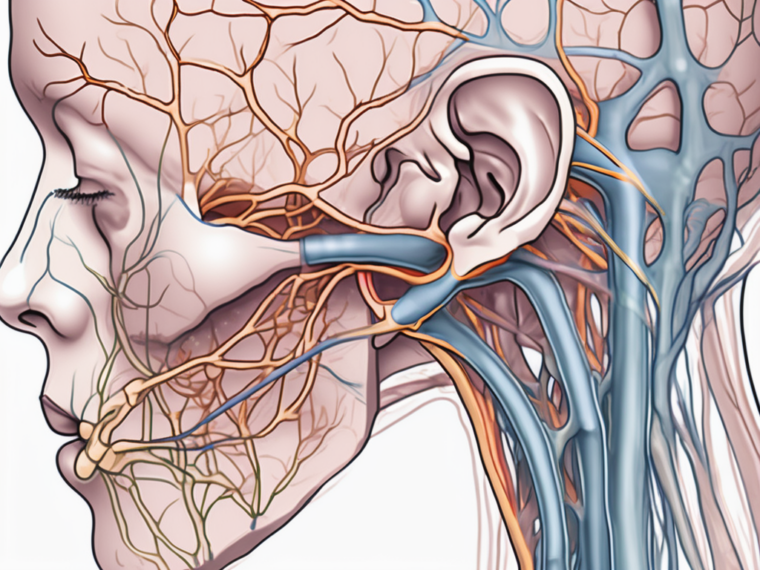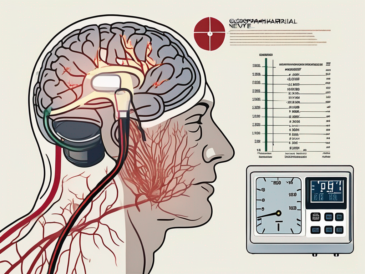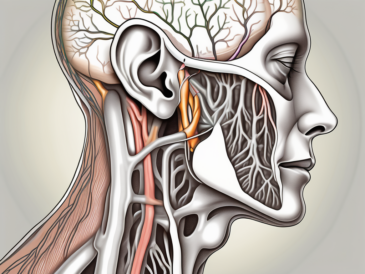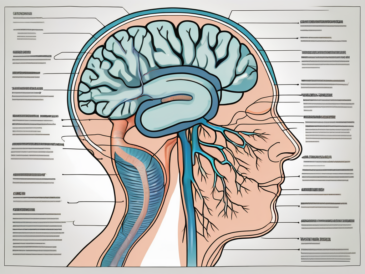The human body is a complex and fascinating structure, with numerous intricate connections and pathways. One such connection involves the glossopharyngeal nerve (CN IX) and its impact on glandular function. In this article, we will explore the anatomy, functions, and implications of parasympathetic innervation from the glossopharyngeal nerve on glands in the human body.
Understanding the Glossopharyngeal Nerve (CN IX)
The glossopharyngeal nerve, also known as CN IX, is one of the twelve cranial nerves in the human body. It arises from the medulla oblongata, the lower part of the brainstem. This nerve plays a crucial role in various sensory and motor functions related to the head, neck, and throat.
Within its intricate structure, the glossopharyngeal nerve contains both sensory and motor fibers. The sensory fibers transmit information from the back of the throat, tongue, and certain parts of the ear to the brain. On the other hand, the motor fibers control the muscles responsible for swallowing and certain functions of the salivary glands.
Anatomy of the Glossopharyngeal Nerve
The glossopharyngeal nerve originates from the medulla oblongata and exits the skull through the jugular foramen, a bony opening located at the base of the skull. From there, it branches out and extends its fibers to various regions, including the head, neck, throat, and glands.
This intricate network of nerves allows the glossopharyngeal nerve to interact with different structures, facilitating essential physiological functions.
As the glossopharyngeal nerve travels through the head and neck, it forms connections with other nerves, such as the vagus nerve and the accessory nerve. These connections create a complex network that coordinates various functions, including swallowing, speech, and even the regulation of blood pressure.
Within the throat, the glossopharyngeal nerve innervates the muscles involved in swallowing, allowing for the smooth movement of food from the mouth to the esophagus. It also plays a role in the gag reflex, a protective mechanism that helps prevent choking by triggering the contraction of certain muscles in the throat.
In addition to its motor functions, the glossopharyngeal nerve carries important sensory information. It provides taste sensation to the back of the tongue, allowing us to perceive the flavors of food and beverages. This taste sensation is crucial for our enjoyment of food and plays a role in our overall sense of taste.
Functions of the Glossopharyngeal Nerve
The glossopharyngeal nerve serves a range of functions within the human body. Its key role involves carrying sensory and motor signals to and from specific regions.
On the sensory side, the glossopharyngeal nerve is responsible for transmitting taste signals from the back of the tongue, as well as providing sensation to the throat, tonsils, and certain parts of the ear.
Motor-wise, the glossopharyngeal nerve controls the muscles involved in swallowing and gag reflexes, ensuring the efficient movement of food and maintaining a healthy airway.
In addition to these primary functions, the glossopharyngeal nerve also plays a role in regulating blood pressure. It contains specialized receptors called baroreceptors, which detect changes in blood pressure. When these receptors sense a decrease in blood pressure, they send signals through the glossopharyngeal nerve to the brain, triggering a response to increase blood pressure and maintain homeostasis.
Furthermore, the glossopharyngeal nerve is involved in the regulation of salivation. It stimulates the salivary glands, promoting the production and secretion of saliva, which is essential for the initial digestion of food and the maintenance of oral health.
Overall, the glossopharyngeal nerve is a vital component of the intricate network of cranial nerves, contributing to the proper functioning of various physiological processes. Its sensory and motor functions are essential for taste perception, swallowing, gag reflexes, blood pressure regulation, and salivation.
The Parasympathetic Nervous System Explained
Before delving into the specific connection between the glossopharyngeal nerve and glands, it is essential to understand the broader context of the parasympathetic nervous system.
The parasympathetic nervous system is one of the two major divisions of the autonomic nervous system, responsible for regulating and maintaining various essential bodily functions. Unlike the sympathetic nervous system, which is associated with the body’s fight-or-flight response, the parasympathetic nervous system promotes relaxation and restorative processes.
But what exactly is the role and importance of the parasympathetic nervous system? Let’s explore further.
Role and Importance of the Parasympathetic Nervous System
The parasympathetic nervous system controls several vital functions, including heart rate, digestion, and glandular secretions. It serves as the body’s “rest and digest” system, responsible for conserving energy and promoting overall well-being.
When we are in a state of relaxation, the parasympathetic nervous system takes over, slowing down our heart rate and promoting efficient digestion. It allows our body to focus on essential processes such as nutrient absorption and waste elimination.
Furthermore, the parasympathetic nervous system plays a crucial role in maintaining homeostasis. By regulating glandular secretions, it ensures that our body produces the necessary substances in the right amounts, promoting proper functioning and overall health.
Now that we understand the importance of the parasympathetic nervous system, let’s explore how it accomplishes its tasks through innervation.
How Parasympathetic Innervation Works
Parasympathetic innervation involves the transmission of signals through specific nerves, which then stimulate target organs or glands to produce secretions. These signals travel along the parasympathetic pathways, which consist of neurons and fibers located throughout the body.
When it comes to glandular innervation, parasympathetic fibers release neurotransmitters, such as acetylcholine, which bind to receptors on the glands’ cells. This binding triggers a series of biochemical reactions, ultimately leading to the secretion of specific substances.
For example, in the salivary glands, parasympathetic innervation stimulates the release of saliva, aiding in the initial stages of digestion. Similarly, in the lacrimal glands, parasympathetic signals promote tear production, keeping our eyes moisturized and protected.
It is fascinating to see how the parasympathetic nervous system intricately controls various glandular secretions, ensuring that our body functions optimally. Understanding these processes allows us to appreciate the complexity and efficiency of our physiological systems.
In conclusion, the parasympathetic nervous system plays a vital role in promoting relaxation, regulating essential bodily functions, and maintaining overall well-being. Its innervation of glands ensures the secretion of necessary substances, contributing to homeostasis and proper functioning. By understanding the intricacies of the parasympathetic nervous system, we gain a deeper appreciation for the remarkable mechanisms that keep our bodies in balance.
Glands in the Human Body
Glands play a crucial role in maintaining overall health and regulation within the human body. These specialized structures produce and secrete various substances, influencing a range of physiological processes.
Let’s delve deeper into the fascinating world of glands and explore the different types and functions they possess.
Different Types of Glands
There are different types of glands in the human body, each with its unique structure and function. These include exocrine glands, which release secretions through ducts onto epithelial surfaces, and endocrine glands, which secrete hormones directly into the bloodstream.
Exocrine glands, such as salivary glands and sweat glands, are responsible for producing substances like saliva and sweat. These secretions serve various purposes, from aiding in digestion to regulating body temperature and eliminating toxins.
On the other hand, endocrine glands, such as the pituitary gland and thyroid gland, release hormones that regulate numerous bodily functions. These hormones act as chemical messengers, traveling through the bloodstream to target organs and tissues, ensuring proper functioning and maintaining homeostasis.
Functions of Various Glands
Each gland in the human body has its specific function and influences various physiological processes. For instance, the salivary glands produce saliva, which aids in digestion and lubricates the oral cavity. This lubrication allows for smooth swallowing and protects the delicate tissues of the mouth from damage.
Meanwhile, the thyroid gland, located in the neck, secretes hormones that regulate metabolism and energy levels. These hormones play a vital role in determining how the body uses energy, affecting everything from weight management to mood stability.
Other glands, such as the adrenal glands, produce hormones like adrenaline and cortisol, which are involved in the body’s stress response. These hormones help prepare the body for fight or flight situations, increasing heart rate, boosting energy levels, and sharpening focus.
Understanding the functions of different glands is essential in comprehending the implications of parasympathetic innervation from the glossopharyngeal nerve on their functioning. The intricate network of nerves and glands working together ensures proper communication and coordination within the body, allowing for optimal health and well-being.
As we continue to unravel the mysteries of the human body, the importance of glands becomes increasingly evident. From regulating bodily functions to maintaining balance, these remarkable structures play a vital role in our overall health and well-being.
The Connection between the Glossopharyngeal Nerve and Glands
Now, let’s explore the intricate relationship between the glossopharyngeal nerve and the glands it innervates. This connection plays a critical role in regulating glandular function and maintaining a healthy physiological balance.
The glossopharyngeal nerve, also known as cranial nerve IX, is one of the twelve cranial nerves originating from the brainstem. It emerges from the medulla oblongata, a vital part of the brainstem responsible for controlling various autonomic functions.
The glossopharyngeal nerve interacts with various glands in the head and neck region. Specifically, it innervates the parotid gland, a salivary gland located in front of each ear. Through the release of parasympathetic fibers, the glossopharyngeal nerve helps stimulate and regulate salivary gland secretion.
The parotid gland is the largest of the salivary glands and plays a crucial role in the initial stages of digestion. It produces saliva, a watery fluid containing enzymes that aid in the breakdown of food particles. The glossopharyngeal nerve’s innervation of the parotid gland ensures the timely release of saliva when needed.
When food is present in the mouth, the glossopharyngeal nerve detects its presence and triggers the release of saliva by the parotid gland. Saliva assists in the initial breakdown of food, making it easier to swallow and digest. This process is crucial for maintaining proper nutrition and overall health.
The innervation of the parotid gland by the glossopharyngeal nerve highlights its crucial role in maintaining proper glandular functioning. Without the proper innervation, the parotid gland’s ability to secrete saliva would be compromised, potentially leading to difficulties in chewing, swallowing, and overall oral health.
Disruptions in the glossopharyngeal nerve’s innervation can result in conditions such as dry mouth or decreased salivation, leading to discomfort and potential oral health complications. In such cases, consulting a medical professional is advisable to assess and address any underlying issues.
Furthermore, the glossopharyngeal nerve also plays a role in the innervation of other glands in the head and neck region. It provides sensory innervation to the carotid body, a small chemoreceptor organ located near the bifurcation of the carotid artery. The carotid body is responsible for monitoring the levels of oxygen and carbon dioxide in the blood, helping to regulate breathing and maintain homeostasis.
In addition to the parotid gland and the carotid body, the glossopharyngeal nerve also innervates the stylopharyngeus muscle, which plays a role in swallowing and speech. This muscle helps elevate and widen the pharynx, facilitating the passage of food and fluids from the mouth to the esophagus.
In conclusion, the glossopharyngeal nerve’s connection to various glands in the head and neck region is vital for maintaining proper glandular functioning and overall physiological balance. Its innervation of the parotid gland ensures the timely release of saliva, aiding in the initial stages of digestion. Disruptions in this innervation can lead to oral health complications, highlighting the importance of seeking medical attention when necessary.
Identifying the Gland Receiving Innervation from the Glossopharyngeal Nerve
Determining the gland that receives parasympathetic innervation from the glossopharyngeal nerve is crucial in understanding the broader implications of this connection.
The Process of Nerve Innervation in Glands
Glandular innervation involves the transmission of signals from specific nerves to stimulate glandular activity. In the case of the glossopharyngeal nerve, its parasympathetic fibers specifically target the parotid gland, exerting control over its secretion process.
This process occurs through a series of chemical and electrical signals, which ultimately trigger the release of saliva by the parotid gland.
The parotid gland, one of the major salivary glands, is located near the front of the ears. It is responsible for producing saliva, which plays a crucial role in the initial stages of digestion by moistening food and aiding in its breakdown.
When food enters the mouth, the glossopharyngeal nerve detects its presence and sends signals to the parotid gland, initiating the secretion of saliva. This process is essential for proper oral health and the facilitation of efficient digestion.
Determining the Specific Gland
By analyzing the innervation patterns and understanding the anatomical connections within the human body, it becomes clear that the parotid gland, located near the front of the ears, receives parasympathetic innervation from the glossopharyngeal nerve.
This interaction is vital for maintaining proper salivary secretion and overall oral health. However, it is important to note that innervation patterns may vary in different individuals, and consulting a medical professional is always advised to ensure accurate diagnosis and treatment if necessary.
Implications of Parasympathetic Innervation from the Glossopharyngeal Nerve
The parasympathetic innervation from the glossopharyngeal nerve holds several implications for both glandular function and overall health.
The glossopharyngeal nerve, also known as cranial nerve IX, is responsible for providing parasympathetic innervation to various structures in the head and neck region. One of its important functions is to regulate the secretion of saliva by the parotid gland, which is the largest salivary gland located near the ears. This innervation plays a crucial role in maintaining proper oral health, aiding in digestion, and ensuring overall comfort.
When the glossopharyngeal nerve functions optimally, it stimulates the parotid gland to produce saliva, which is essential for breaking down food particles and facilitating the process of digestion. Saliva also contains enzymes that help in the initial stages of digestion by breaking down carbohydrates. Additionally, saliva helps to lubricate the oral cavity, making it easier to swallow and speak.
Disruptions in the parasympathetic innervation from the glossopharyngeal nerve can lead to dry mouth, also known as xerostomia. This condition can be caused by various factors, including nerve damage, certain medications, or systemic diseases. Dry mouth not only affects an individual’s ability to speak and eat comfortably but also increases the risk of dental problems such as tooth decay and gum disease. It can also lead to difficulties in tasting and swallowing food, which can have a negative impact on an individual’s quality of life.
Potential Health Effects
Proper parasympathetic innervation from the glossopharyngeal nerve ensures the regulated secretion of saliva by the parotid gland, aiding in digestion, oral health, and overall comfort. Disruptions in this innervation can lead to dry mouth and potential oral health complications, affecting an individual’s quality of life.
Furthermore, the parasympathetic innervation from the glossopharyngeal nerve also plays a role in regulating blood pressure. It helps to maintain a balance between the sympathetic and parasympathetic nervous systems, which are responsible for controlling various bodily functions. This balance is crucial for overall health and well-being.
In addition to its role in glandular function, the glossopharyngeal nerve is also involved in the sensation of taste. It carries taste information from the posterior one-third of the tongue, allowing us to perceive different flavors. This sensory function is essential for enjoying food and beverages and plays a significant role in our overall sensory experience.
Importance in Medical Science
Understanding the intricate connections between cranial nerves and glands, such as the glossopharyngeal nerve and the parotid gland, is crucial in medical science. This knowledge allows healthcare professionals to diagnose and treat conditions that may interfere with glandular function, ensuring optimal patient care and well-being.
Medical professionals rely on a thorough understanding of the glossopharyngeal nerve’s innervation and its role in glandular function to identify and manage various conditions. For example, damage to the glossopharyngeal nerve can occur due to trauma, infections, or tumors, leading to conditions such as glossopharyngeal neuralgia or salivary gland disorders. By recognizing the symptoms associated with these conditions and conducting appropriate diagnostic tests, healthcare professionals can provide targeted treatments and interventions to alleviate symptoms and improve patients’ quality of life.
However, it is important to remember that this article serves as a source of general knowledge and should not replace professional medical advice. If you experience any symptoms or concerns related to glandular function, it is always advisable to consult with a qualified healthcare professional who can provide accurate diagnosis and appropriate guidance.
In conclusion, the parasympathetic innervation from the glossopharyngeal nerve plays a vital role in regulating glandular function, particularly the parotid gland located near the ears. This innervation enables the secretion of saliva, facilitating digestion, oral health, and overall well-being. Understanding the connection between cranial nerves and glands is crucial for medical professionals in diagnosing and treating glandular disorders. However, individual experiences may vary, and seeking professional medical advice is always recommended for accurate evaluation and personalized care.



